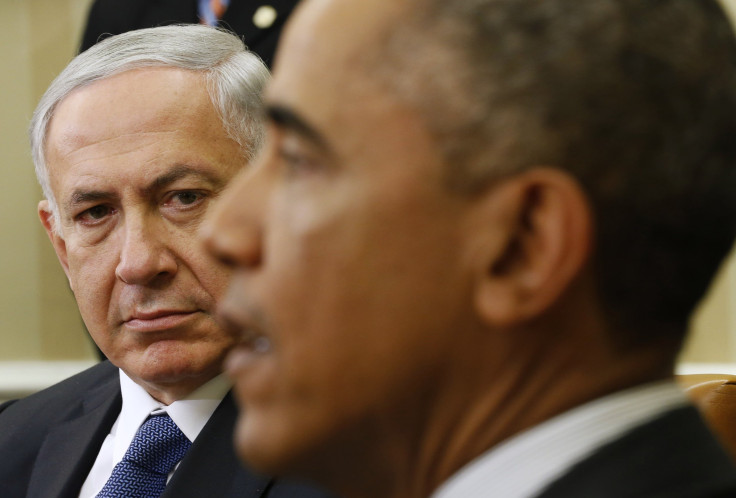Netanyahu White House Visit 2015: Israel Premier Expected To Request Billions In Military Aid As Iran Nuclear Deal Sets Off Arms Race
Israeli Prime Minister Benjamin Netanyahu was expected to bring a lengthy wish list to his meeting with President Barack Obama at the White House Monday in the first face-to-face meeting between the two leaders since the bitterly fought Iran nuclear deal was approved. Netanyahu was expected to request state-of-the-art military technology and some $5 billion per year in aid that Israeli officials say is necessary to ensure their country’s security as sanctions are gradually eased against Iran.
“It’s not going to be warm and fuzzy,” said Michael Oren, an Israeli lawmaker who was Netanyahu’s U.S. envoy for five years, speaking on the meeting in Washington, according to the Washington Post. “It’s about what we need to defend ourselves and what we need to deter Iran.”
The U.S. already spends about $3.1 billion a year in military aid for Israel. The 10-year agreement is set to expire in 2017, and while Netanyahu might not secure all the new items for which he's hoping, analysts said he is likely to meet a receptive Obama. But they said more lies behind Israel’s request for greater military support than fear of an unleashed Iran following sanctions relief. As Gulf states build up their weapons arsenal in preparation for sanctions being lightened, and Israel wishes to ensure it remains the strongest power in the region, the Iran nuclear deal has set off something of an arms race.
“Israel fears the military balance of power in the region has been affected negatively by the nuclear agreement,” said Dov Waxman, professor of international relations and Israel studies at Northeastern University in Massachusetts. “Ultimately, although [the Gulf states] don’t pose a threat to Israel today, the Israelis worry about the stability of those regimes, and that the arms those regimes receive might ultimately fall into the hands of groups or regimes that could pose a security threat to Israel.”

Obama and Netanyahu were also expected Monday to discuss broader regional security issues, how to peacefully prevent Iran from obtaining a nuclear weapon and the conflict between Israelis and Palestinians.
The Iran nuclear deal, reached in July among the U.S., Iran and five other world powers, is expected to see some sanctions on Iran lifted in exchange for a commitment from the Islamic Republic to forfeit its nuclear enrichment program. Iran's adversaries in the region fear an unleashed Iran will build up its weapons arsenal years down the road as Russia is already reportedly modernizing its S-300 missile defense system in hopes of delivering the technology to Iran.
U.S. arms sales to the region’s top five purchasers -- Saudi Arabia, the United Arab Emirates, Iraq, Egypt and Algeria -- rose to more than $18 billion this year, compared with some $12 billion last year, the Guardian reported in April. The U.S. has a memorandum of understanding with Israel that ensures its commitment to Israeli military superiority in the region, meaning any major advancement to Arab states needs to be matched by increased support for Israel.
Israeli officials say they need an array of aircraft, arms and surveillance equipment in the face of new threats in the region. Among them, in addition to a purported threat by post-sanction Iran, Israeli leaders have expressed concern about the Shiite militia Hezbollah in Lebanon, Palestinian militants in the Gaza Strip and Islamic militant groups now operating in Syria, Iraq and Egypt.
“These are the real issues,” said Anthony Cordesman, the Burke chair of Middle East strategy for the Center for Strategic and International Studies in Washington. While he said Israel certainly viewed Iran as a threat, it was a more distant one, and not one that might require the military technology Israel was expected to request. “That’s a missile threat, and a nuclear one, not conventional warfare,” he said.
Lockheed Martin Corp., Raytheon Co., Boeing Co. and Textron Inc.’s Bell Helicopter unit were expected to be the main defense contractor beneficiaries of boosted Israeli military aid, according to Bloomberg. No deals are expected to be signed off on during the meeting Monday.
The Israeli premier's visit to the U.S. comes as relations between Netanyahu and Obama have been strained for months. Netanyahu’s March speech to the Republican-led Congress, where he railed against the Iran deal and called on lawmakers to support Israel, prompted Obama to announce Netanyahu would not be welcome at the White House at that time. Democrats saw it as an attempt to undermine Obama's authority and deepen a bipartisan wedge. Now that the nuclear agreement is a done deal, Israeli officials have expressed a willingness to move beyond disagreement and start to look forward toward a post-sanctions Iran.
The request for boosted funding, at a testy time for Israeli-American relations, is expected to be as much about politics as about security. Many Israelis, while concerned about the Iran nuclear deal, are also troubled by a widening gap between the Israeli and American governments. Obama has criticized Netanyahu over his failure to advance toward a two-state solution, and was expected to press him on the issue, according to news reports. The U.S. leader has lost hope a major peace accord can be reached between the Palestinians and Israelis before he leaves office. The meeting at the White House will be a time for Netanyahu to prove the U.S.-Israel relationship still is strong, analysts say.
“This meeting, and anything that comes out of it, is more about Netanyahu saving face after being humiliated, and Obama being able to say everything’s back on track with the Israelis,” said Roby Barrett, an expert with the Middle East Institute in Washington. “Netanyahu can go home and say: ‘You see? You criticized me, but we still have a wonderful relationship.’ ”
© Copyright IBTimes 2024. All rights reserved.






















